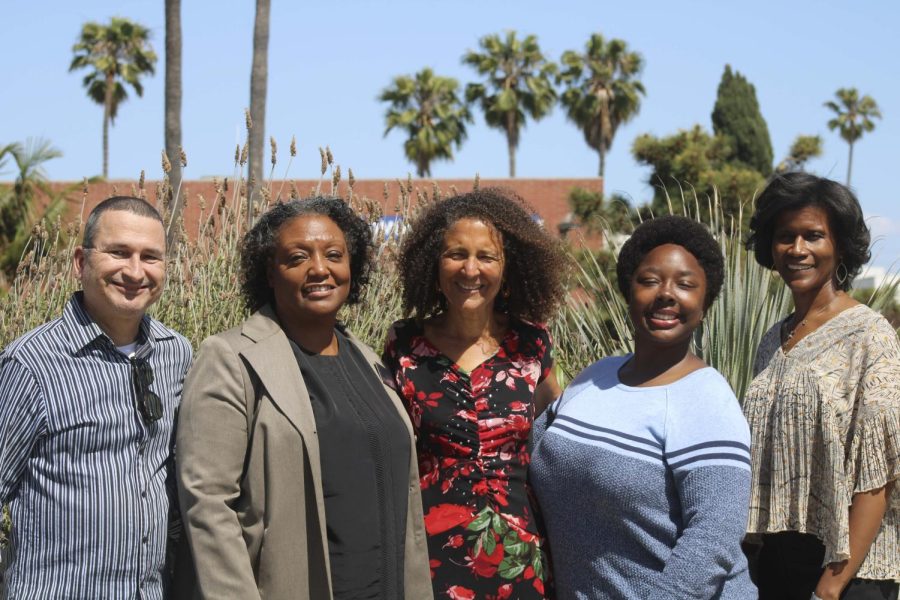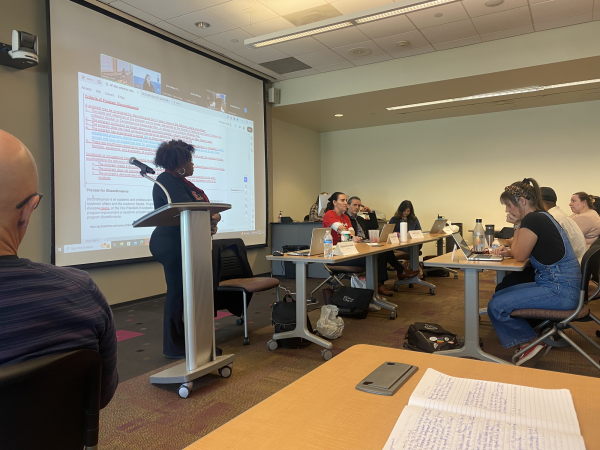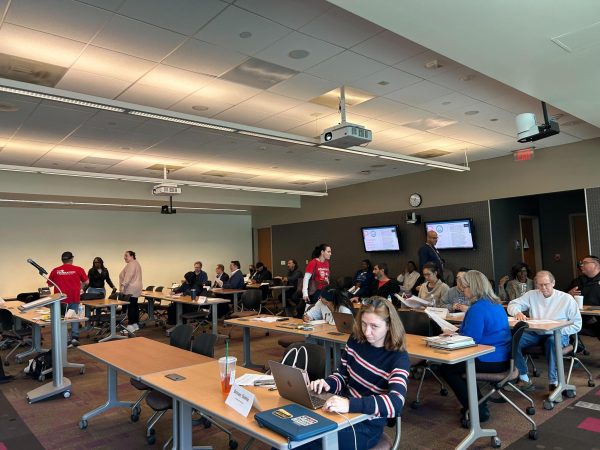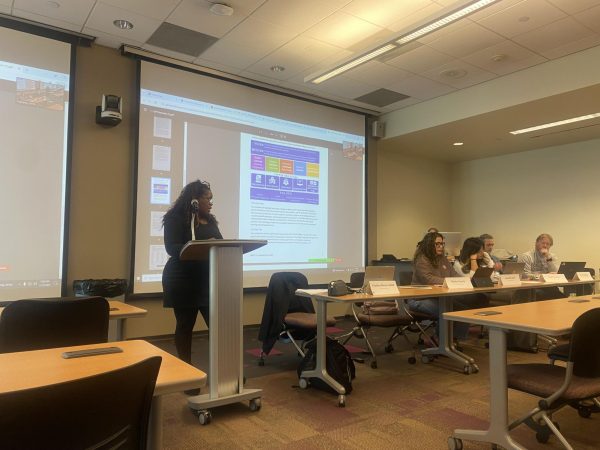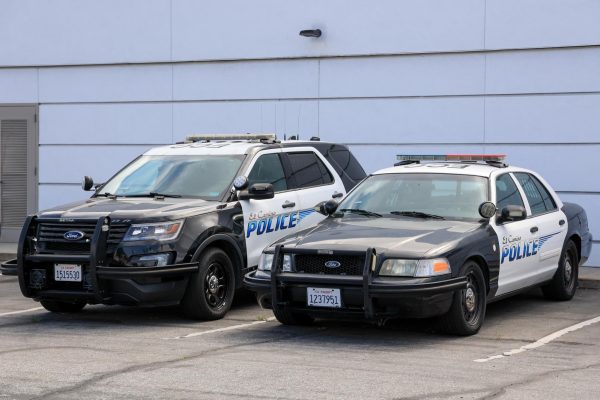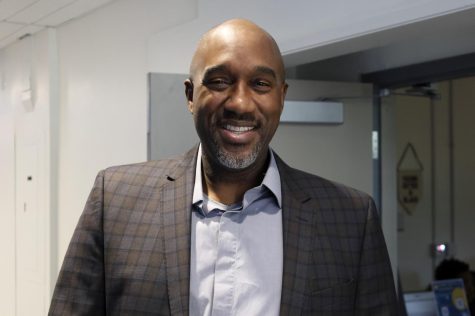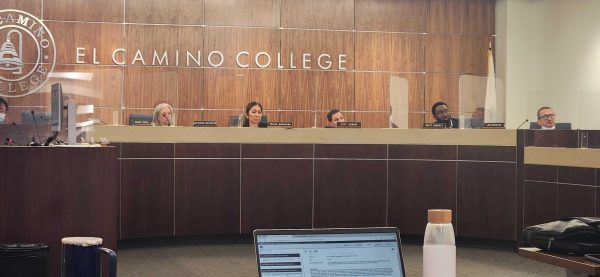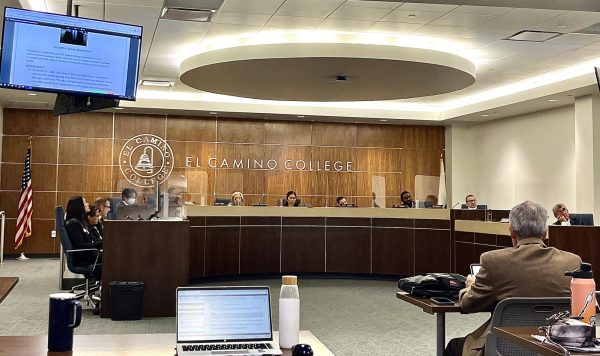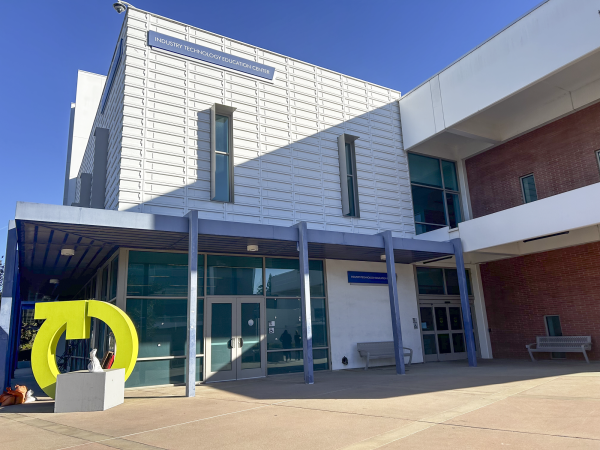El Camino’s land has ties to historic Black-owned property
(L-R) Board of Trustees President Nilo Vega Michelin, Superintendent/President Brenda Thames, Author/Historian Alison Rose Jefferson, studio arts major Valerie Varnado, 27, and Library and Learning Resources/Event Coordinator Linda Cooks gather after a lecture on “The History We Stand On: Re-inserting the African American Experience into the South Bay History of Los Angeles County” at El Camino College on Thursday, April 21. (Elsa Rosales | The Union)
El Camino College invited historian and research expert Alison Rose Jefferson to speak about the history of the land the college sits on in efforts of land acknowledgment.
Jefferson is an independent historian and heritage conservation consultant. She was the guest speaker at The History We Stand On presentation in April.
As a researcher with a masters in heritage conservation at USC and a Ph.D. in history from UCSB, Jefferson has been doing research work for years.
During Jefferson’s research on African Americans in the Jim Crow era, she came across information about the history of the college through her research on Wilbur C. Gordon.
Gordon was a Black physician involved in property-owning, investing, and development of Black leisure sites in areas such as Lake Elsinore in the early 20th century.
“As I was doing research on him, I found information about Gordon Manor, and it just happened that it was on the land that eventually became El Camino, Alondra park, and the golf course,” Jefferson said.
Jefferson said the 213-acre plot of land where the manor was to be located was intended to be reserved for about a thousand residential houses with a subdivision clubhouse and a streetcar in relation to major streets and proximity to beaches.
The projected cost of the manor was about $7 million in the 1920s.
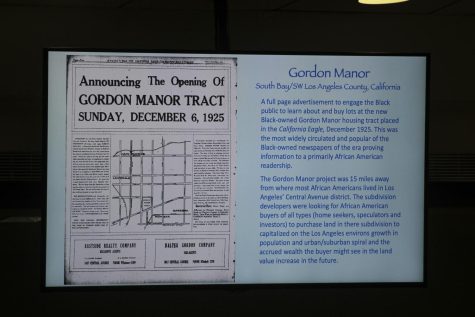
Various Palos Verdes residents such as lawyer Henry O’Melveny, former U.S. Secretary of the Treasury, Frank Vanderlip and architect Frank Olmstead Jr., “destroyed [the Manor] along with the other people who forced the eminent domain condemnation for the park district and claimed they would create a ‘public benefit,'” Jefferson said.
The “benefit” would eventually become Alondra Park and Golf Course along with El Camino College in the late 1940s.
“If they hadn’t created the park, the last former landholders of the Manor could have potentially gotten the land back,” Jefferson said.
After the destruction of the manor, Jefferson said that Gordon “probably went on to do some other smaller real estate investing,” but she is not sure since, “there’s no archive that has his papers, he has no children, and so the record is really thin.”
Kerri Webb, Director of Public Information and Government Relations in the Marketing and Communications Department, was involved in promoting the presentation. She described the overall feeling in the room as a shock upon hearing the history.
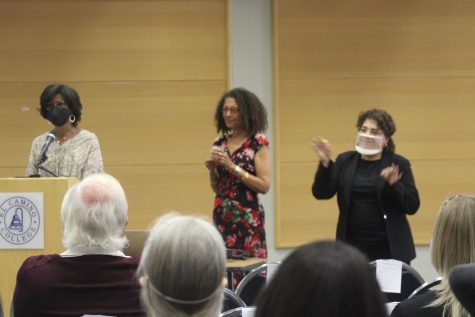
Part-time El Camino College Faculty Librarian, Linda Cooks, said the history of the Gordon Manor was brought up to the Land Acknowledgement Committee by Social Science professor Sandra Uribe who read Jefferson’s book.
Cooks is also the co-chair of the Land Acknowledgement Committee as well as the event organizer for The History We Stand On presentation.
The Land Acknowledgement Committee came up with a Land Acknowledgement Statement on behalf of the college in November, “that recognizes and gives respect to the indigenous people who are the original stewards of this land,” Cooks said.
The Land Acknowledgement Committee follows multiple institutions doing their own acknowledgment work and as a collaborative effort with members of the Behavioral and Social Sciences Division and students from the Associated Students Organization.
“It was a perfect fit to have Dr. Alison Rose Jefferson to come and speak about a topic that’s so closely tied into our identity,” Cooks said
The library is currently hosting an exhibit that includes six phases of the history of the land the college sits on. The exhibit will be on display until Sept. 30
This includes “the history of the Gabrielino-Tongva people, the Spanish mission system and the colonization that took place, the Mexican military that was a part of that colonization, the development of the rancho system, the Japanese tenant farming and internment camps, and the Gordon Manor housing tract,” Cooks said.
Jefferson is doing her own exhibit called “Radical Leisure” with the California African American Museum based on the materials in her book. The exhibit opens in February 2023 and will run until June 2023.
More of Jefferson’s research can be found in her book, “Living the California Dream African American Sites during the Jim Crow Era,” which has been optioned by Amazon to use the content for a TV mini-series featuring Brad Pitt and Viola Davis, with a focus on the local history of Bruce’s Beach which is highlighted in her book.
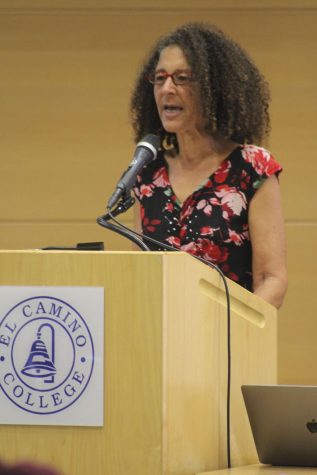
The book is available at the college’s library in digital and physical form and is going to be a part of a Land Acknowledgement collection in the library’s archives.
This collection will include, “anything [the committee] uses in order to do the history, the posters from events, and the digital materials,” Cooks said, “It’s bringing all the evidence together.”
Webb explained the significance of the incorporation by the college of exposure to learning more about these historical events.
“These types of stories are so necessary because they’ve been very deliberately and cleverly obscured,” Webb said, “I think it’s really great that El Camino College is willing to put this discourse out in the public, have a public conversation about it, and acknowledge that this took place on this land.”



